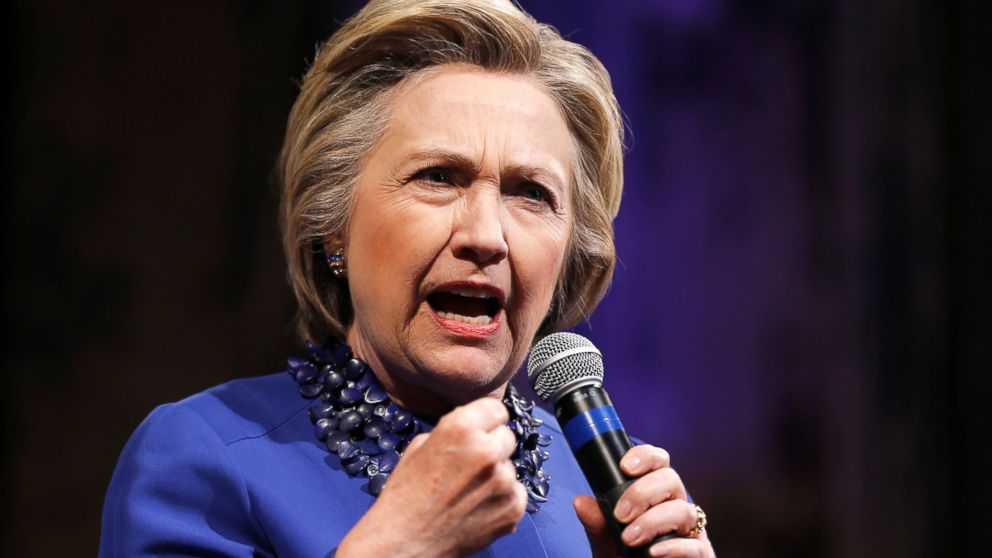In West Virginia, Hillary Clinton Says She's 'Sorry' About Reaction to Coal Comments
— -- Democratic presidential candidate Hillary Clinton kicked off a two-day tour of West Virginia, Ohio and Kentucky by saying she was "sad" and "sorry" about the reaction to her saying in a CNN town hall in March, “we’re going to put a lot of coal miners and coal companies out of business.”
At a campaign event in Williamson, West Virginia, on Monday evening, Bo Copley, who identified himself as an out-of-work coal miner, poignantly asked Clinton "how you can say you’re going to put a lot of coal miners out of -- out of jobs and then come in here and tell us how you’re going to be our friend.
"Because those people out there don’t see you as a friend," Copley said, referring to protesters who had gathered outside the Williamson Health and Wellness Center.
“What I said was totally out of context from what I meant,” Clinton told Copley, “because I have been talking about helping coal country for a very long time.”
She called her comment at the CNN town hall a “misstatement.”
“What I was saying is that, the way things are going now, we will continue to lose jobs,” she said. “That’s what I meant to say.”
She added, “I do feel a little bit sad and sorry that I gave folks the reason or the excuse to be so upset with me because that is not what I intended at all.”
The exchange was another sign that the Clinton name -- once popular in coal country -- is now a tough sell for voters whose local economies have been devastated by closing coal mines. Over the weekend, Clinton's most important campaign surrogate -- husband and former President Bill Clinton -- made his way to Logan, West Virginia, a town of less than 2,000 people nestled along the Guyandotte River, where residents didn’t exactly roll out the red carpet.
A local public relations professional, Dave Allen, sent an email to a representative in West Virginia Sen. Joe Manchin’s office ahead of the scheduled event asking that the Clintons not campaign on city property.
“Bill and Hillary Clinton are simply not welcome in our town,” the email message said. “Mrs. Clinton’s anti-coal messages are the last thing our suffering town needs at this point.”
Allen, who said he sent the message on behalf of the City of Logan, explained to ABC News that the “intention was not to stop the event. They just wanted to send a message.”
Sen. Manchin, who was on hand to introduce the former president at Logan Middle School on Sunday, was interrupted by boos and protests from the audience.
“I understand; I feel the pain, guys,” the Democratic senator said. “Bill and Hillary Clinton can carry the suffering that we’ve got.”
He added, “The economy is horrible, and we’re fighting every day to change that,” specifically blaming President Obama and his energy policies.
Across the street, supporters of Republican frontrunner Donald Trump held signs that read “coal” and “vote for Trump, vote for jobs.” A few supporters of Democratic rival Bernie Sanders joined in, as well. On stage, Bill Clinton was unruffled despite being booed and heckled by a group of demonstrators.
“This state’s not that different from the one I grew up in,” he said, referring to Arkansas.
On stage, Clinton said he told his wife, “I want you to send me to West Virginia," to send him to "any place in America that feels left out and left behind.”
But so far the Clintons have had a rocky start to their “Breaking Down Barriers” tour of Appalachia, where Hillary Clinton has promised to “focus on the aspirations and needs of families, especially in often overlooked or underserved communities across the country." West Virginia holds its Democratic primary on May 10 and Kentucky holds its primary on May 17.
At an event earlier Monday in Ashland, Kentucky, Clinton said she wanted her husband to "come out of retirement” to help her come up with a manufacturing and jobs plan if she wins the White House.
"I’ve told my husband he’s got to come out of retirement and be in charge of this because, you know, he’s got more ideas a minute than anybody I know,” Clinton said.
ABC’s Liz Kreutz contributed to this report.




